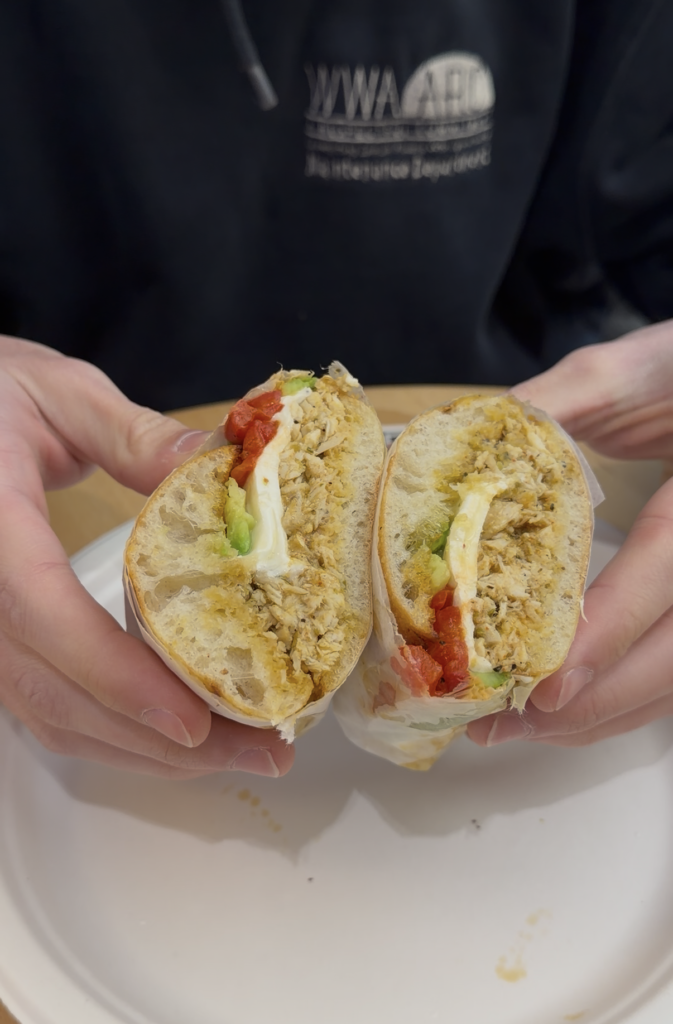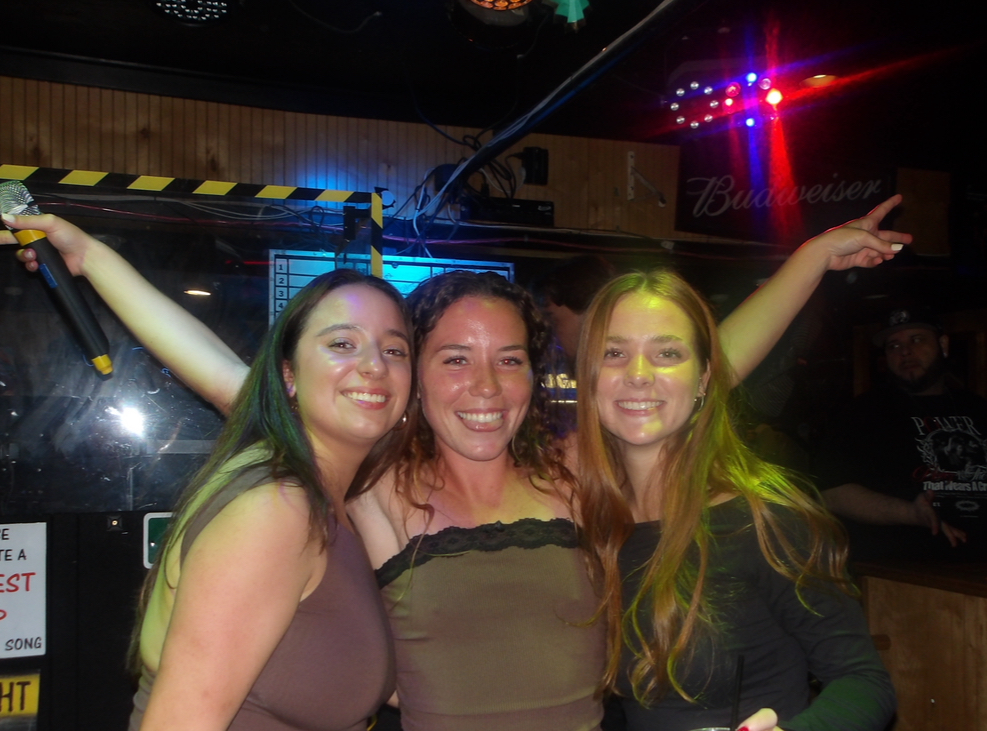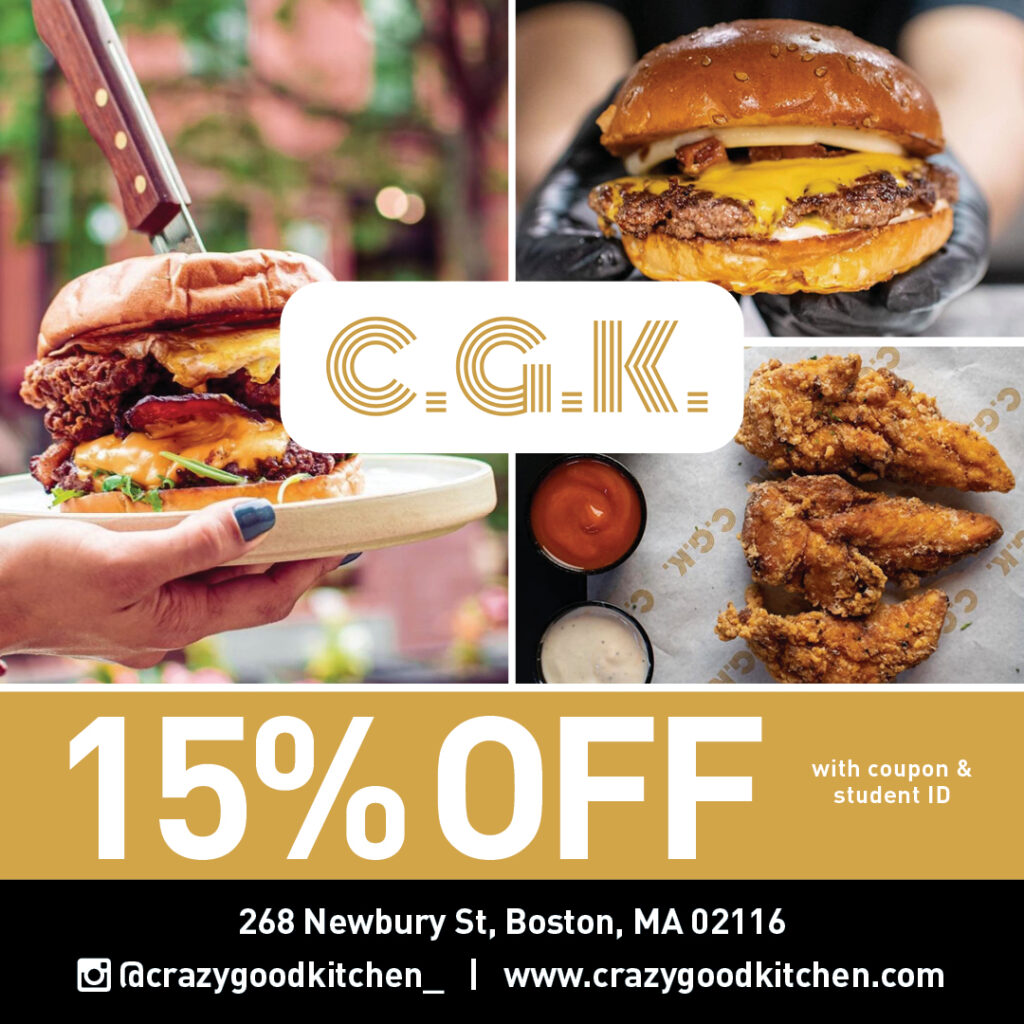
Manhattan Mini Storage Spring 2026
February 26th, 2026
Village Clipper Spring 2026
February 26th, 2026Just Around the Corner: Amorino
January 14th, 2026Even on brisk January days, New Yorkers crave ice-cold sweet treats after their savory lunch breaks. My friend Alonso Manon from Boston University visited Manhattan for a week, and we both craved dessert.
Мгновенно получите необходимые средства через проверенный сервис rusbank.net. Качественный микрозайм онлайн помогает быстро исправить финансовое положение. Микрофинансовые организации одобряют заявки круглосуточно и переводят деньги на карту без лишних проверок.

This month is international student appreciation month, and many vendors in the New York University area are offering discounts to all students to celebrate. Manon, from Mexico City, was ecstatic to join me in tasting the various flavors that Amorino had to offer. The dessert spot, located just around the corner from the main NYU campus, specializes in their coned, creamy gelatos.
To start, I enjoyed a thick hot chocolate topped with a mountain of whip cream and chocolate drizzle. Manon ordered a large sage-green pistachio latte.
“The pistachio flavor was not overly strong, and blended well with the coffee,” Manon said. “You can taste that they use real pistachios. It wasn’t very sweet and had a nutty aftertaste. For the price and quality, I would definitely go here for a latte over major chains like Starbucks.”
Before the main dessert, he also indulged in their unique hot chocolate affogato. One staff member poured the hot chocolate over the ice cream in front of us, enhancing our experience at the quaint shop.

“The hot chocolate was rich but went really well with the ice cream,” he reviewed. “I usually don’t like chocolatey things, but this might have been my favorite item.”
Our main events were the macaron signature cone and gianduiotto signature cone. My personal favorite were the hazelnut and dulce le leche petals of the gelato flower, though the blueberry cheese cake and caramel were also delicious flavors. My cone had a chocolate rim, while Manon’s cone came with a singular pistachio macaron.

“I got straticella, coffee, coconut, and pistachio,” he noted. “The flavors went together perfectly, and I love the way they serve the ice cream like flower petals. Even though I might not want to pay more for the macaroon, mostly because the ice cream is filling enough, I still would recommend trying it at some point if you are looking to try one for the first time.”

Just Around the Corner: Fresh & Co
January 12th, 2026In between the bustle of meetings and classes, it’s hard to find time to return to the dorms and cook a hearty meal. Just around the corner from New York University is a Fresh&Co location, with plentiful options ranging from salads, to a hot bar, to affordable sandwiches for students.
“The chicken was well seasoned and the peppers were flavorful, though it all overpowered the avocado,” Nick Messina, a business student at Stevens Institute of Technology, reviewed.

He ordered a chicken fresco sandwich from the wide splay of choices, served immediately after one staff member toasted it to perfection. I opted for the smoked salmon sandwich, most notable for its unique combination of scallion cream cheese and pumpernickel bread.
The balance between the thinly sliced cucumbers and tomato, paired with the cuts of smoked salmon and sprinkle of capers, made this a filling lunch between study sessions. Meanwhile the chicken fresco uses avocado, queso fresco, and roasted chicken for the bulk of its contents. A layer of roasted red peppers and a bed of tomatillo salsa is added on ciabatta bread for a delicious hot meal.
“Good consistency on the bread. It was light and airy,” Messina said.
Outside of the sandwiches is an open fridge of beverages and breakfast items to grab-and-go. The salad bar has a plethora of options for different palates, while the hot bar has mouthwatering skewers of different meats to showcase. Regardless of what someone craves for lunch, they are sure to find something at Fresh&Co for a reasonable price.
During restaurant week, the establishment is offering $8 sandwiches to students when they present the Campus Clipper coupon and valid student ID. January is international students month, where Fresh&Co is promoting their 30% off sandwiches deal. Similar deals are on rotation on the Campus Clipper website–the way students learn to save money!

Upcoming Campus Clipper Event: Celebrate International Student Month with us!
December 15th, 2025
For over 25 years, the Campus Clipper has helped college students in New York City—and later in Boston and Philadelphia—save money and succeed in city life. We offer a digital coupon booklet with discounts on food, clothing, and services, plus an Official Student Guidebook with real advice on how to navigate college life in a big city. Our internship program lets students build skills, earn money, and publish their own e-books. Follow us on Instagram and TikTok @CampusClipper, and sign up for our newsletter to get deals straight to your inbox. To access the digital coupons, scan the QR code on our printed card—available in dorms, student centers, and around campus.
Rediscover Yourself and Your Town
November 5th, 2025
We are always waiting. Waiting for an event that takes place next week, month, year. Waiting for a trip or to graduate, and to graduate again. Waiting to hear back from a job or waiting for a horrible shift to just be over.
Even as children we wait for adulthood eagerly, no matter how many adults tell you not to grow up too fast. You can’t stop the daydreaming child from missing out on their present, but you, present you, can enjoy the current moment as an adult.
We have to stop waiting. This is a lesson I’ve learned, surprisingly, from living at home. As a commuter it can feel like you are missing out on college. Instead of trying to make the experience fun, I found myself waiting for post grad to feel independent. I truly thought I had to wait until I had an apartment or a home to have fun, but really what is stopping me from having fun right now?
So my perspective shifted and I forced myself to go out more. Sometimes by myself to cafes and parks, other times to bars with friends. I try to make the most of being at home, hosting slumber parties just like when I was a kid. I see my family members everyday and have movie nights with my mom. These moments I will miss one day, so I am enjoying them to the fullest.
One day a couple years from right now, you are going to be reminiscing on where you are right now. I think about this a lot. It doesn’t always have to be the rapid go, go, go. This mindset really pushes me to enjoy where I am at presently, even when that feels hard to do.
Go to your local lakes and ponds. Go see the museums nearby. Rediscovering your town will truly feel like rediscovering yourself. Where you are right now is your present, so enjoy it to the fullest. Decorate your room, even if it is your childhood bedroom. Make art and do hobbies you love. There is truly no time like the present, why waste it waiting?
Even though I have lived in one area my entire life there is still so much of it I haven’t seen. I have made it my goal to become an actual local. I want to be able to give recommendations to people that I didn’t just look up on Google or Tiktok. The only way to have real recommendations is to experience it yourself.
Commuting can feel stagnant, but it is a time for growth and solidifying real connections. I lived on campus, and I have discovered some friendships are just a form of object permanence. If you aren’t right in front of some people, you don’t exist. It is something I have had to learn. While it isn’t easy to let go of friendships I have made old friendships stronger and new friends. We have to put in effort to see each other, and we do so. I am confident that the friends I have now I will have long after college, and this is quite a relief.
I am enjoying the present, and I enjoy the struggles of college and commuting. One day I am confident that I will feel nostalgic for it-just as I feel nostalgic for all of my past eras.

By Isabel DeSisto
Isabel DeSisto is a senior majoring in Writing, Literature, and Publishing at Emerson College. She is an avid traveler and is always looking to go on a trip. While adventurous, there is nothing she enjoys more than hanging out with her dogs and reading a book.
For over 25 years, the Campus Clipper has helped college students in New York City—and later in Boston and Philadelphia—save money and succeed in city life. We offer a digital coupon booklet with discounts on food, clothing, and services, plus an Official Student Guidebook with real advice on how to navigate college life in a big city. Our internship program lets students build skills, earn money, and publish their own e-books. Follow us on Instagram and TikTok @CampusClipper, and sign up for our newsletter to get deals straight to your inbox. To access the digital coupons, scan the QR code on our printed card—available in dorms, student centers, and around campus.
Just Around the Corner: Thin Cookies
November 2nd, 2025Sometimes we all just need a sweet treat. Sometimes the pastries and baked goods in New York City are six dollars each. As a student with a strict budget, I can’t spend an absurd amount of money on desserts, let alone meals in general. Just around the corner from New York University is a small, bright yellow shop, selling their own unique take on a classic dessert. Thin Cookies is known for exactly what their name expresses.
One afternoon, after our classes, my friend Alonso and I picked up a dozen thin cookies and ate them in Washington Square Park. Their prices were much more affordable and reasonable compared to many popular cookie spots. There are flavors that remain a staple on the menu, available to customers every week, while others are seasonal and rotate out. We decided to try a mixture of both the classics and temporary picks.
Our first cookie was the chocolate chip, followed by the much darker in color, double chocolate.
“It’s soft, chewy, with the chocolate slightly melted,” Alonso noted. “It’s thin, buttery, and I could eat 6 of these. Perfect level of sweetness. The double chocolate kinda tastes the same as the last one but amazing, a slight increase in chocolate but not over bearing.”
Next was the golden perfection of everyone’s favorite fall-themed and festive dessert: the snickerdoodle. This cookie was my personal favorite and was the highlight of this dessert flight.
“It was so so good–perfect mix of cinnamon and sugar. Very light. I could eat a whole box of these and still want more,” my friend commented.
Coconut, Alonso’s personal favorite, was another soft and buttery sweet treat. We ate two.
“Coconut flakes. Perfect amount of sweetness. It had bits of coconut adding to the texture and emboldening the taste,” he said.
Because Alonso hates bananas, and everything bananas, he wasn’t a fan of the seasonal banana pudding cookie. I thought it was scrumptious and airy.
“Taking away my bias, I will say it taste exactly like banana pudding. So if you are a fan of it, you will love it,” Alonso admitted.
For students looking to try affordable sweet treats near the New York University area, they can head over to Thin Cookies for a wide range of flavors. Make sure to say the Campus Clipper sent you, as they have rotating deals for students when they show their valid student ID.
You can’t commute from across the world
October 22nd, 2025
If I had to give one piece of advice to students entering college, commuting or not, it would be to study abroad.
I give this advice with adequate experience as I have studied abroad twice. During my sophomore year (Fall 2023) I spent a semester in the Netherlands. Emerson College has a unique program called Kastell Well. In this program you live in a castle in a rural part of the country close to Germany. The medieval castle was beautiful and the surrounding village was full of kind people and many small farms. We travelled practically every weekend to different European cities, so coming back to the peaceful Dutch countryside was a respite.

I loved being abroad so much, but the castle was Emerson’s main program. There are many other shorter ones but I wanted to get more credits out of the trip. Luckily we have an expansive abroad department. Through some quick research I discovered Emerson was involved in exchange programs with different schools. I applied for two, one in Spain and one in Switzerland. Ultimately I decided to only continue with my Switzerland application and a few months into my junior year I discovered I was chosen to participate in the exchange program. In the second half of my junior year (Spring 2025) I went to Europe again, this time staying in Lugano, Switzerland. Lugano is named after the large lake the city resides on, Lake Lugano. It is beautiful and surrounded by mountains. The everyday view I had walking to classes was unreal. Switzerland has three different national languages, German, French, and Italian, these are based on what part of Switzerland you reside in. My temporary school, Franklin University, was in the Italian region. Lugano was extremely close to Italy, and we found ourselves going often.
Being abroad was the best experience of my life. I travelled all of the time; by the end of my two semesters I had visited 14 European countries, some more than once. I had been to museums that I learned about as a child and saw artifacts from history books. I saw the paintings and actual brush strokes on the canvas of Van Gogh and Rembrandt.
I made friends from all over the world. I hiked a mountain by myself and ate pasta in Italy and pierogies in Poland. Basically, it was an unreal experience that I couldn’t have gotten any other way.
Both of the times I was abroad there was academic travel. We would go with professors to see what we were learning about. At Emerson we went to Amsterdam and Prague. At Franklin I went to Sicily for my organized crime class– it was a highlight of my trip. Being able to see firsthand the monuments and documents you learned about, even if they are in a different language, is so unbelievably amazing.
In general getting an international education shifts your perspective. You learn different teaching styles and focus on different aspects of the material.
While the classroom is so important abroad, it is the life lessons that you learn. Especially when commuting. Commuting makes it hard to become an individual. Yes you are an adult now, but you are an adult that still goes to school and lives at home. Sometimes it is hard to separate that from highschool. Being in a country on your own is the highest level of independence. You aren’t even in the same time zone as your family!
Studying abroad is transformative. You have to learn how to navigate buses, trains, airports, most of which are in different languages. You have to learn how to communicate and adapt to different social norms. By studying abroad you gain crucial life skills that you can’t learn without experiencing it.
As a commuter going to a different country may seem like a giant step, and it is. But it is worth it. I was nervous both times I left to go abroad, and despite how badly I wanted to, I cried, both times. Once I was on the plane though, it was just a matter of time until I would be back home, so I was determined to make the most of it.
Once you get there it is like freshman year moving into the dorms again. Everyone is trying to find friends. As a commuter you may not have experienced the chaos of the first week of freshman year, but you find your friends fast from it. Everyone is in the same boat.
If you have ever wanted to see what the dorm life was like, study abroad. It is easier to justify than a dorm that is drivable distance from your home. Sometimes, at least in my case, it costs less than living on campus. It is also much better than housing because you are in a different country.
Different schools have different housing abroad, but either way you will be living more independently.
Most schools have extensive abroad lists and there are many scholarships! It may seem impossible, but truly it is so doable. Going abroad cost just as much, possibly cheaper, than when I lived on campus.
I believe it is the perfect way to get out there and explore the world and yourself. Everyone is in the same boat as you, so trust me you will find your crowd.

By Isabel DeSisto
Isabel DeSisto is a senior majoring in Writing, Literature, and Publishing at Emerson College. She is an avid traveler and is always looking to go on a trip. While adventurous, there is nothing she enjoys more than hanging out with her dogs and reading a book.
For over 25 years, the Campus Clipper has helped college students in New York City—and later in Boston and Philadelphia—save money and succeed in city life. We offer a digital coupon booklet with discounts on food, clothing, and services, plus an Official Student Guidebook with real advice on how to navigate college life in a big city. Our internship program lets students build skills, earn money, and publish their own e-books. Follow us on Instagram and TikTok @CampusClipper, and sign up for our newsletter to get deals straight to your inbox. To access the digital coupons, scan the QR code on our printed card—available in dorms, student centers, and around campus.
Romanticize your life, your commute, everything
October 16th, 2025
Many social media trends are more than fleeting. Only a few trends have stuck with me, most are purely nostalgic. However one trend portraying people romanticizing their lives has always stuck with me-especially when I started commuting.
In short, romanticizing your life means taking notice of simple tasks and moments. Making everything mean something. For a while this was a big trend online, one I found myself searching for.
I found myself captivated by videos showing normal actions. Filling fridges and laundry supplies-for example. I loved watching people light candles and clean. All of these actions I could and should have done myself. It wasn’t just the actual actions these influencers were partaking in, it was how they presented them. Everything was aesthetic and sounded nice too.
When influencers showed themselves drinking coffee in cute pyjamas looking out a window I realized in some way I can attain that. Of course social media is only a snippet of life, but it looked genuinely peaceful. I found when I wore pyjama sets (although I never do) and sip some tea outside I felt balanced and calm.
The idea of romanticizing everything in life may seem problematic. Perhaps some may argue people are choosing to live in delusion rather than face the mundane reality. When I romanticize my life I find I am more productive and feel overall better.
Of course when I was obsessed with the idea of romanticizing everything I spent a lot of money. In order to romanticize your life it seemed like you needed to spend money on all the cute, aesthetic things. Now this is completely just consumerism, and you do not need to spend anything to romanticize your life.
You can stand outside with tea or coffee in old pyjamas that don’t go together in any way. Putting more energy into studying and listening to music is all it takes to romanticize life slightly. Instead of just watching a show I light candles. It is all about a wonderful ambiance and the full-fillment you get. That is what makes it so special; you can make it yours completely.
Sometimes when I try to romanticize life I work on being in the moment. I often catch myself being caught up in the future. What work am I going to have to do when I get home? What am I going to do after I graduate? What are my plans next week?
Instead of creating mind lists sometimes you just need to watch outside as the train moves.
Regarding college, the idea of romanticizing everything works well with studying. I love annotations and find myself listening to chill music with a good pen and highlighter. It’s silly, but it almost feels aesthetic. The motivation to finish a book or annotate a paper keeps me doing my work at a reasonable pace.
I am the worst at keeping a routine, but I am someone who needs one. Without a routine time seems to fly by, and I end up doing nothing. Having a routine, whether it is strict or loose, is a way I have found myself going out and feeling better about my life.
Set a routine that works for you; it doesn’t have to be anything insanely rigid. Having something simple that you do every day and that you look forward to is something I have found to be valuable.
Being in the best mindset and as happy as you can be has helped me immensely, and I am sure it will help you too.

By Isabel DeSisto
Isabel DeSisto is a senior majoring in Writing, Literature, and Publishing at Emerson College. She is an avid traveler and is always looking to go on a trip. While adventurous, there is nothing she enjoys more than hanging out with her dogs and reading a book.
For over 25 years, the Campus Clipper has helped college students in New York City—and later in Boston and Philadelphia—save money and succeed in city life. We offer a digital coupon booklet with discounts on food, clothing, and services, plus an Official Student Guidebook with real advice on how to navigate college life in a big city. Our internship program lets students build skills, earn money, and publish their own e-books. Follow us on Instagram and TikTok @CampusClipper, and sign up for our newsletter to get deals straight to your inbox. To access the digital coupons, scan the QR code on our printed card—available in dorms, student centers, and around campus.
Couch Crashing 101
October 13th, 2025
When you live off campus it isn’t every day that you can go out. You need to make arrangements now. Going out quickly changes from a spontaneous decision to having to plan well in advance.
It is good practice for the post grad world, but it definitely puts a damper on the college experience.
Recently, I went out and it was (sort of) spontaneous. With only a two day notice I figured out my plans on how to safely have a night out. There are many little things that go into deciding whether or not to go out–money, schoolwork, etc.
However, the most important question that needs to be solved before going out is: how do I get back home?
There are a few options to safely get back home after going out.
- Staying sober and driving home.
- Having a friend or family member drive you home.
- Paying for an Uber.
Having to rely on loved ones to bring you home all the time can be difficult and Ubers can be costly. Staying sober is always the most responsible decision, but sometimes you want to let loose with your friends.
Luckily there is another option–couch crashing. This one also can involve the least amount of planning (depending on person to person) and therefore the nights can be spontaneous once again.
Here is a quick breakdown on how to properly couch crash.
First find a friend with a couch, or at least an apartment- there is always the floor. Then of course ask if you can stay the night. Never assume, especially in Boston where most people have at least one roommate. Some roommates aren’t going to want a stranger on their couch.
Next, see what your friend has and what you need to bring. In other words, figure out if they have a pillow and blanket that you can borrow. If not, I highly recommend bringing at least one or the other, both are best. You are already going to be sleeping on a dorm or cheap apartment couch, so it is best to have something comfortable. You also don’t have to bring much to these sleepovers. I went straight from classes, but was able to fit everything in my backpack.
The most important items I brought were:
A water bottle
A second pair of shoes (you don’t want to be walking home in pyjamas and heels)
Pyjamas
I didn’t find I needed much else. Everyone is different, but I recommend not overthinking when packing for an overnight stay. It makes the morning much easier when you have just one bag to bring home.
For me an Uber trip from home to the city (and vice versa) can cost anywhere from 40-70 dollars. This adds up quickly. Having to pay for an Uber has convinced me to stay at home multiple times.
Now you may still be thinking it’s worth paying the money to Uber back. Uber costs can vary, so it may be inexpensive to get home and sleep in your bed. Sometimes Ubers are long, expensive, uncomfortable, and not guaranteed.
Having a guaranteed place to stay allows the night to be carefree and fun. Not worrying about when you have to leave and how you are going to get home.
Couch crashing doesn’t need to be complicated, but it can be really fun.
Part of the fun of couch crashing is it can be like a nostalgic sleepover. My friends and I got some food, chatted, and watched a show before we all went to sleep. It ended up being one of the best parts of the night. It is almost like an opposite pregame where instead of getting ready with your friends, you wind down with them.
Everything is an experience. Try to make the most of everything in college, even if it is sleeping on the most uncomfortable couch ever created.

By Isabel DeSisto
Isabel DeSisto is a senior majoring in Writing, Literature, and Publishing at Emerson College. She is an avid traveler and is always looking to go on a trip. While adventurous, there is nothing she enjoys more than hanging out with her dogs and reading a book.
For over 25 years, the Campus Clipper has helped college students in New York City—and later in Boston and Philadelphia—save money and succeed in city life. We offer a digital coupon booklet with discounts on food, clothing, and services, plus an Official Student Guidebook with real advice on how to navigate college life in a big city. Our internship program lets students build skills, earn money, and publish their own e-books. Follow us on Instagram and TikTok @CampusClipper, and sign up for our newsletter to get deals straight to your inbox. To access the digital coupons, scan the QR code on our printed card—available in dorms, student centers, and around campus.



